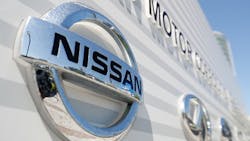Nissan Reaches 'Rock Bottom' on Dividend Cut, Decade-Low Profit
Nissan Motor Co. predicted annual operating profit below even the most pessimistic analyst’s estimate and cut its dividend for the first time in a decade, giving partner Renault SA a potential opening to push for greater control over their automaking alliance.
Hurt by slumping U.S. sales, aging vehicle models and an out-of-sync product cycle, the Japanese automaker issued an outlook for profit of 230 billion yen (US$2.1 billion) for the fiscal year ending March 2020, roughly half of the average projection for 453 billion yen. Nissan also reported its lowest annual profit in a decade at 318 billion yen.
The results put additional pressure on Chief Executive Officer Hiroto Saikawa to deliver a turnaround following the dramatic arrest of Carlos Ghosn, the former chairman and architect of the alliance between Nissan, Renault and Mitsubishi Motors Corp. To do so, Saikawa is cutting 4,800 jobs, revamping car models and focusing more on retail sales in the U.S.
“This feels like a return back to the pre-Ghosn era,” said Koji Endo, an analyst at SBI Securities. “They may close a factory and adjust production. In order to do this, they will need money, and this is probably why the dividend was cut.”
Nissan said it plans to pay out 40 yen a share, down from 57 yen, the first reduction since dividends were suspended in 2009.
“The cut was a huge shock,” Endo said. “Nissan was popular among investors because it has been increasing dividends regardless of its performance. If that’s gone, it could drop to an all-time low.”
The dividend cut also will impact Renault, which owns 43% of Nissan. The French automaker’s shares fell by as much as 3.7% in early trading in Paris as investors digested the lower payout outlook. Nissan fell 3% to 840 yen at the close in Tokyo before the results, following a report in the Nikkei newspaper on the lower profit forecast.
The surprise jailing of Ghosn, who led Nissan and Renault for two decades, exposed rifts over control and decision-making. Since then, Ghosn was released, detained again and currently is back out on bail. Ghosn has denied all charges against him, saying his arrest was due to a “dirty game” played by some Nissan executives. He is now preparing for a trial that may start later this year or next.
Nissan cut its midterm revenue targets for fiscal 2022 to about 14.5 trillion yen from 16.5 trillion yen and cut its operating margin target to 6% from 8%. While the automaker has blamed its performance on poor strategic decisions by Ghosn, Saikawa is facing internal strife over whether he’s the right executive to lead Nissan. So far, the CEO has pushed back against renewed efforts by Renault to deepen their partnership by adopting a holding company structure.
Saikawa said Renault Chairman Jean-Dominique Senard agreed that this isn’t the right time to review the capital structure.
The Japanese automaker said it will cut staff and spend 47 billion yen during the next three years to refresh all core models, introduce 20-plus new models and focus on retail sales in the U.S.
“In the past we overstretched ourselves to grow,” Saikawa said, adding that he would move away from the strategy of seeking market share with incentives and change Nissan’s cost structure. “Such surgery should be done fast.”
Although Renault owns a stake in Nissan, the Japanese automaker is the bigger partner and owns 15% of Renault, with no voting rights. They produce a combined 10.8 million cars each year, almost double Ford Motor Co.’s global deliveries. The alliance — currently held together by a series of cross-shareholdings — would be second in vehicle sales only to Germany’s Volkswagen AG, with Toyota Motor Corp. a close third.
Although Ghosn’s arrest shook the partnership to its core, they will need each other more than ever as the industry undergoes a fundamental shift toward electric and self-driving vehicles.
“All three partners need the alliance to flourish given the much-needed economies of scale it brings,” Michael Dean, a Bloomberg Intelligence analyst, said before the results. “We are amid a culture of global automotive companies clamoring to collaborate with each other, given the huge costs associated with the transition to EVs, e-mobility, digitalization and autonomous driving.”
In order to get a leg up in electric cars, Nissan is looking to invest in a Chinese electric-car startup by buying a stake of as much as 25%, people familiar with the matter said. The potential targets include WM Motor Technology Co., Zhejiang Hozon New Energy Automobile Co. and CHJ Automotive Co., the people said, asking not to be identified.
Renault agreed in 2015 not to interfere in the Nissan board’s decision-making. Their cross-shareholding is managed by an agreement known as Rama, which was last updated in 2015 with extensive governance provisions that have never been made public. Any unilateral move by either Renault or Nissan to tip the balance could trigger an all-out battle for control.
Nissan released an internal report on its investigation into Ghosn’s conduct alongside the earnings report, concluding that there were weaknesses in its controls. The company also filed corrected securities reports for 2005 to 2017 to reflect Ghosn’s alleged under-reporting of tens of millions of dollars of income.
Ghosn and longtime aide Greg Kelly were arrested after an internal investigation uncovered what the company says were financial misdeeds that included alleged misuse of corporate funds.
Nissan last year booked a one-time charge of 9.2 billion yen to reflect Ghosn’s yet-to-be-paid remuneration. Nissan also said the scandal hurt its brand and curbed domestic sales in Japan.
“Today is rock bottom,” Saikawa said. “In the next two years or three years at the longest, we will get back to our previous levels. Please give us some time.”
By Ma Jie and Maiko Takahashi
About the Author
Bloomberg
Licensed content from Bloomberg, copyright 2016.
